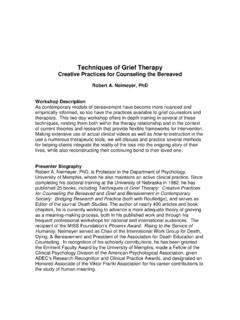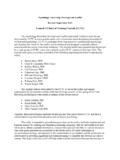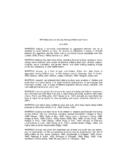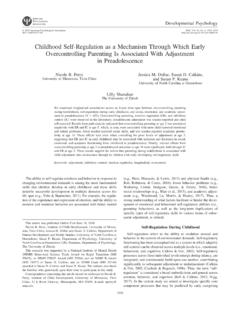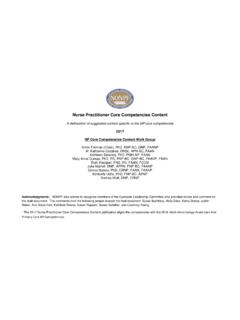Transcription of Competencies for Psychology Practice in Primary Care1
1 Exhibit 1 Primary Care Psychology Competencies 1 Competencies for Psychology Practice in Primary Care1 Report of the Interorganizational Work Group on Competencies for Primary Care Psychology Practice2 Approved by APA Council of Representatives, 2015 Suggested Citation: American Psychological Association. (2015). Competencies for Psychology Practice in Primary Care. Retrieved from 1 This policy describes Competencies that serve as aspirational goals for psychologists in Primary care settings. It is meant to guide training programs curriculum development and psychologists self-monitoring. This policy is in no way intended to create a standard of Practice , particularly for psychologists already trained and practicing in the field. Nor is it intended to limit the ability of psychologists to Practice within their scope of licensure under state law, or to limit coverage, reimbursement or credentialing by third party payors for psychological services within that scope of licensure.
2 2 The Interorganizational Work Group on Competencies for Primary Care Psychology was convened as initiative of APA President Suzanne Bennett Johnson, PhD. Members included Susan McDaniel, PhD (Chair); Barbara Cubic, PhD; Christopher Hunter, PhD; Michel Karel, PhD; Lisa Kearney, PhD; Rodger S. Kessler, PhD; Kevin Larkin, PhD; Stephen McCutcheon, PhD; Benjamin F. Miller, PsyD; Justin Nash, PhD; Sara Qualls, PhD; Kathryn Sanders, PhD; Catherine Schuman, PhD; Terry Stancin, PhD; Annette Stanton, PhD; Lynne Sturm, PhD and Education Directorate Staff Catherine Grus, PhD and Jan Sheri-Morris. Exhibit 1 Primary Care Psychology Competencies 2 Table of Contents Executive Summary .. 3 Introduction .. 6 Background .. 6 About the Competencies .. 10 Cluster 1. Science .. 12 Cluster 2. Systems .. 18 Cluster 3. Professionalism.
3 24 Cluster 4. Relationships .. 29 Cluster 5. Application .. 33 Cluster 6. Education .. 46 References .. 52 Appendix A: Definitions of Key Terms .. 56 Appendix B: Roster of Inter- Organizational Work Group Members and Organizations Represented .. 59 Appendix C: Key Documents used by the Work Group .. 63 Exhibit 1 Primary Care Psychology Competencies 3 Executive Summary The majority of people in the United States seek and receive care for mental health, substance abuse and health behavior problems in Primary care (PC). They present with problems as unique diagnoses and as part of other comorbid illnesses. As such, PC practices are addressing the biopsychosocial needs of their patients by including psychologists as interdisciplinary team members in their provision of integrated PC. Research shows that this type of integrated Primary care (see Appendix A) is associated with improved outcomes for both health and mental health problems (Butler, Kane et al, 2008; Unutzer, Schoenbaum et al, 2006).
4 Although PC Psychology has been an area of focus over the past few decades, there is no generally accepted articulation of the Competencies psychologists must have to effectively work in PC medial settings. This report is the outcome of an initiative by the 2012 American Psychological Association (APA) president, Suzanne Bennett Johnson PhD to delineate Competencies for PC Practice . The work group consisted of representatives from nine national organizations with a central focus on education or Practice in PC Psychology . Six broad core competency domains and specific Competencies for each area are described: 1. Science Science Related to the Biopsychosocial Approach Research/Evaluation 2. Systems Leadership/Administration Interdisciplinary Systems Advocacy 3. Professionalism Professional Values and Attitudes Individual, Cultural and Disciplinary Diversity Exhibit 1 Primary Care Psychology Competencies 4 Ethics in Primary Care Reflective Practice /Self-assessment/Self-care 4.
5 Relationships Interprofessionalism Building and Sustaining Relationships in Primary Care 5. Application Practice Management Assessment Intervention Clinical Consultation 6. Education Teaching Supervision Within each competency, essential knowledge, skills, and attitudes as well as behavioral anchors (or examples) are provided. Delineation of these Competencies is intended to inform education, Practice and research in PC Psychology and efforts to further develop essential team-based Competencies in PC. Definitions The work group agreed to a set of definitions drawn from the current literature to guide the development of this document. Appendix A provides additional definitions employed by the work group. Primary Care (PC) is the provision of integrated, accessible health care services by an interdisciplinary team of clinicians who are accountable for addressing a large majority of personal health care needs, developing a sustained partnership with patients, and practicing in the context of family and community (Institute of Medicine, 1994, ).
6 Exhibit 1 Primary Care Psychology Competencies 5 PC Psychology is the application of psychological knowledge and principles to common physical and mental health problems experienced by patients and families throughout the lifespan and presented in PC (McDaniel, Hargrove, Belar, Schroeder & Freeman, 2004). Competence in Primary care Psychology refers to the knowledge, skill, and attitudes and their integration that allow an individual to perform tasks and roles as a PC psychologist, regardless of service delivery model (Kaslow, Dunn, & Smith, 2008). Competencies are distinctive elements necessary for competence, they correlate with performance and can be evaluated against agreed upon standards (Kaslow, 2004). Essential Components are critical components that delineate the knowledge/skills/attitudes that make up each of the Competencies consistent with the structure of the Benchmarks model (Hatcher et al.)
7 , 2013). Behavioral Anchors are observable, measurable examples of how the essential components might be demonstrated. Behavioral anchors are examples, so they vary by the model of service delivery being used, the population being seen, and the system of care. The Primary care Psychology Competencies : Assume that general Competencies for professional Psychology as articulated in the Benchmarks Model (Hatcher et al., 2013) and the Competencies for psychologists as Health Service professionals (HSPEC, 2012) are attained and sustained. Draw from and add to the Competencies that have been proposed for Primary care Psychology (see Key Documents in Appendix C). Exhibit 1 Primary Care Psychology Competencies 6 Introduction Background The biomedical model derived from the germ theory of disease--has characterized Western medicine for over a hundred years.
8 The model was hugely successful at eliminating infectious diseases as the leading causes of death and is considered one of the Primary reasons life expectancy increased from 49 years in 1901 (Glover, 1921) to 78 years in 2007 (Arias, 2011; ; Minino, Arias, Kochanek, Murphy, & Smith, 2002; National Office of Vital Statistics, 1947). However, this model has its limitations. It may be viewed as reductionistic, explaining all illness in biologic terms. It may be viewed as exclusionary, since symptoms that cannot be explained by a biologic pathogen or defect are excluded from consideration. This model reflected a mind-body dualism in which mental disorders are excluded from the Primary concerns of Western medicine unless they could be explained by some underlying biologic defect (Engel, 1977). As a result of this perspective, mental health has been largely carved out of the larger health care enterprise and given limited resources (Belar, 1995).
9 Mental health and physical health professionals have been trained separately, with little or no opportunity to train or work collaboratively. Although George Engel proposed a new medical approach, the biopsychosocial model, in 1977, most of health care continued to embrace the biomedical model until very recently. As health care costs continue to rise (Centers for Medicare and Medicaid Services, 2011), it has become increasingly apparent that the biomedical model alone cannot successfully address today s health care challenges. Most Americans die of chronic diseases, the treatment Exhibit 1 Primary Care Psychology Competencies 7 of which accounts for 75 percent of our health care costs (Centers for Disease Control and Prevention, 2009). Further, the important role of behavior, both patient and health professional behavior, has become increasingly apparent in solving today s health care problems.
10 For example, tobacco use and poor diet and sedentary behavior are the leading causes of death in the United States (Mokdad, Marks, Stroup, & Gerberding, 2004) and medical errors are ranked eighth (Institute of Medicine, [IOM]2000. In response, Engel s biopsychosocial approach is now more frequently espoused by many in medicine. In 1994, the Institute of Medicine proposed that Primary care be defined as the provision of integrated, accessible health care services by an interdisciplinary team of clinicians (IOM, 1994). The Patient Protection and Affordable Care Act (ACA) [ 111-148] (2010) should help make this a reality. ACA requires that essential health benefits include mental health, preventive and wellness services, and chronic disease management in addition to the biologic assays and interventions that have historically comprised healthcare.)

